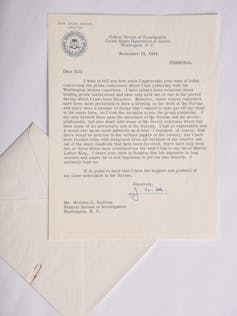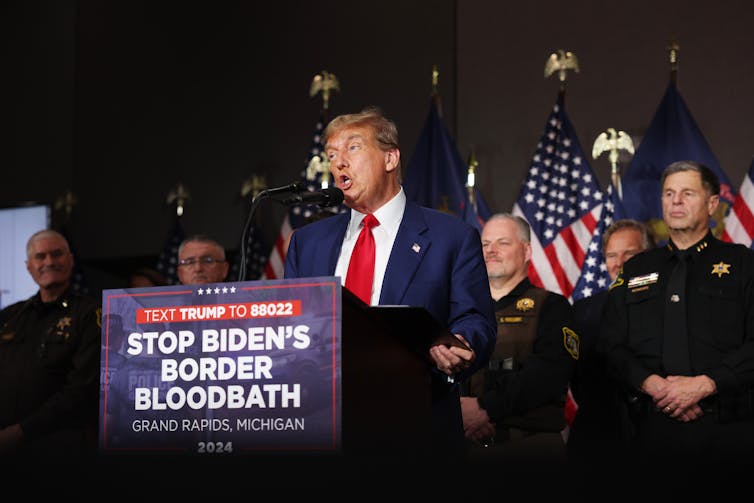President Donald Trump has vowed to focus on his political enemies, and specialists have warned that he might weaponize U.S. intelligence companies to conduct mass surveillance on his targets.
Mass surveillance is the widespread monitoring of civilians. Governments sometimes goal particular teams – comparable to non secular minorities, sure races or ethnicities, or migrants – for surveillance and use the knowledge gathered to “contain” these populations, for instance by arresting and imprisoning individuals.
We’re specialists in social management, or how governments coerce compliance, and we concentrate on surveillance. Primarily based on our experience and years of analysis, we anticipate Trump’s second White Home time period could usher in a wave of spying in opposition to individuals of shade and immigrants.
A person apprehended in an immigration raid on Jan. 28, 2025, sits in a holding cell in New York Metropolis.
Matt McClain/The Washington Publish through Getty Photographs
Spreading ethical panic
Trump is already actively deploying a key tactic in increasing mass surveillance: inflicting ethical panics. Ethical panics are created when politicians exaggerate a public concern to govern actual fears individuals could have.
Take Trump on crime, for instance. Regardless of FBI information exhibiting that crime has been dropping throughout the U.S. for many years, Trump has repeatedly claimed that “crime is out of control.” Stoking worry makes individuals extra prone to again harsh measures purportedly focusing on crime.
Trump has additionally labored to create an ethical panic about immigration.
He has stated, for instance, that “illegal” migrants are taking American jobs. In fact, solely 5% of the 30 million immigrants within the workforce as of 2022 had been unauthorized to work. And in his Jan. 25, 2025, presidential proclamation on immigration, Trump likened immigration on the southern border to an “invasion,” evoking the language of battle to explain a inhabitants that features many asylum-seeking girls and youngsters.
The second step in inflicting ethical panics is to label racial, ethnic and non secular minorities as villains to justify increasing mass surveillance.
Constructing on his rhetoric about crime and immigration, Trump incessantly connects the 2 points. He has stated that migrants homicide as a result of they’ve “bad genes,” echoing beliefs expressed by white supremacists. Throughout the 2016 marketing campaign, Trump’s coinage “bad hombre” invoked stereotypes of harmful migrants crossing the U.S.-Mexico border to steal jobs and promote medication.
The president has equally related Black communities with crime. At an August 2024 rally in Atlanta, Georgia, Trump known as the majority-Black metropolis “a killing field.” The month prior, he stated the identical factor about Washington, D.C.
Major targets
Historical past reveals that within the U.S. ethical panics are most definitely to focus on Latino, Indigenous and Black communities as a precursor to surveillance and subjugation.
Within the 18th century, Colonial politicians handed laws likening the Indigenous individuals of the American colonies to “savages” and handed legal guidelines figuring out Indigenous tribes as political enemies to be assimilated. If “killing the Indian” out of individuals didn’t work, they had been to be tracked down and faraway from the inhabitants by imprisonment or dying.
One other early type of ethical panics escalating to spying and mass surveillance had been southern slave patrols, which emerged within the early 1700s after pro-slavery politicians proclaimed that Black escapees would terrorize white communities. Slave patrols tracked down and captured not solely Black escapees but additionally free Black individuals, whom they offered into bondage. Additionally they imprisoned any particular person, enslaved or not, suspected of sheltering escapees.
As soon as a gaggle of individuals turns into the topic of ethical panics and focused for presidency surveillance, our analysis reveals, the consequences are felt for generations.
Black and Indigenous communities are nonetheless arrested and incarcerated at disproportionately excessive charges in contrast with their proportion within the U.S. inhabitants. This even impacts youngsters, with Indigenous ladies imprisoned at 4 instances the speed of white ladies, and Black ladies at greater than twice the speed of white ladies.
Low-tech strategies
These Twenty first-century numbers replicate a long time of focused surveillance.
Within the Fifties, the FBI beneath Director J. Edgar Hoover created the counter-intelligence applications COINTELPRO, allegedly for investigating communists and radical political teams, and the Ghetto Informant Program. In follow, each applications broadly focused individuals of shade. From Martin Luther King Jr. to U.S. Rep. John Lewis, Black activists had been recognized as a risk, spied on, investigated and typically jailed.

A 1964 letter from J. Edgar Hoover expressing his dislike for Martin Luther King Jr.
Jahi Chikwendiu/The Washington Publish through Getty Photographs
President Lyndon Johnson’s “war on crime,” a sweeping set of federal modifications that militarized native police in city communities, continued this mass surveillance within the Nineteen Sixties. Later got here the “war on drugs,” which an aide to President Richard Nixon later stated was designed explicitly to focus on Black individuals.
In subsequent a long time, politicians would fire up new ethical panics about Black communities – bear in mind the “crack babies” who by no means actually existed? – and use worry to justify police surveillance, arrests and mass incarceration.
These early examples of mass surveillance lacked the know-how that permits spying at this time, comparable to CCTV and hacked laptop computer cameras. Nonetheless, previous U.S. administrations have been remarkably efficient at reaching social management by creating ethical panics then deploying mass surveillance to comprise the “threat.” They enlisted droves of law enforcement officials, recruited informants to infiltrate teams and locked individuals away.
These textbook surveillance strategies are nonetheless routinely used now.
Police fusion facilities
For a lot of People, the time period “mass surveillance” evokes the Division of Homeland Safety, which was based after the 9/11 terrorist assaults. This nationwide company, which varieties a part of a federal intelligence equipment of greater than 20 companies targeted on surveillance, has performed a key function in mass surveillance since 2001, particularly of Muslim People.
But it surely has native assist in the type of police items often known as fusion facilities. These items feed identification info and bodily proof comparable to video footage to federal companies such because the FBI and CIA, based on a 2023 whistleblower report from Rutgers Legislation Faculty.
The New Jersey Regional Operations Intelligence Heart, for instance, is a police fusion heart overseeing New York, New Jersey and Connecticut. It employs superior army know-how to collect large quantities of private information on individuals perceived as potential safety threats. In keeping with the Rutgers report, these “threats” are extremely concentrated in Black, Latino and Arab communities, in addition to areas with a excessive focus of political organizing, comparable to Black Lives Matter teams and immigrant support organizations.
The New Jersey police fusion method results in elevated arrest charges, based on the report, however there’s no actual proof that it prevents crime or terrorism.
Guantanamo and black websites
Given Trump’s pledges to additional militarize border enforcement and broaden U.S. jails and prisons, we anticipate an increase in spending on fusion facilities and different instruments of mass surveillance beneath Trump. The ethical panics he’s been stirring up since 2015 counsel that the targets of presidency surveillance will embrace immigrants and Black individuals.

Donald Trump speaks at a marketing campaign occasion on April 2, 2024, in Grand Rapids, Mich.
Spencer Platt/Getty Photographs
Generally, victims of mass surveillance go lacking.
The Guardian reported in 2015 that Chicago police had been briefly “disappearing” individuals at native and federal police “black sites” since no less than 2009. At these clandestine jails, beneath the guise of nationwide safety, officers questioned detainees with out attorneys and held them for as much as 24 hours with none exterior contact. Most of the victims had been Black.
One other notorious black website was housed on the Guantanamo Bay army base in Cuba, the place the CIA detained and secretly interrogated suspected terrorists following the Sept. 11 terrorist assaults.
Trump appears to be reviving the Guantanamo black website, flying about 150 Venezuelan migrants to the bottom since January 2025. It’s unclear whether or not the U.S. authorities can lawfully detain migrants there overseas, but deportation flights proceed.
The administration has not shared the identities of lots of the individuals imprisoned there.



